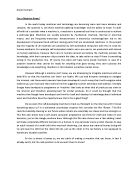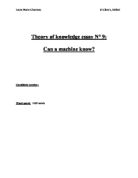Let's start by defining the two main things being discussed here: knowledge and machines. What is knowledge? There seems to be no answer to this question yet, as there is no single agreed definition presently, nor any prospect of one, and there remain numerous competing theories 1. One of these, for example, is Plato's description, which states that it is a justified, true belief. This has been taken as the standard meaning, but does not necessarily indicate that it is the correct one. But it is the one going to be used in this essay. So in order for something to be counted as knowledge, it has to obey three aspects: it must be justified, true and believed. Now let us go on to define the next thing. A machine is scientifically known as a device that takes in some form of energy and changes it into another form that is more suitable for the desired purpose or work 2. So if we take this into consideration, all we have to do is provide it with some sort of energy ("input"), and it does what it is designed to do. Okay, now that we understand more about these two words, let us go back to the question: can a machine know? According to what we have heard so far, there is no possible way that they can do so. If they could in fact "know", then they would be able to do more than just what they have been programmed or made to do.
Considering the agreed definition of knowledge going to be used in this discussion, it can be noticed that it has some faults to it. These faults have been shown by Edmund Gettier, who used some examples to prove that the justified, true, belief (JTB) theory was not a very stable description of knowledge. Here is an example of what the JTB theory tells us: taking a subject S knows that a proposition P is true if, and only if: P is true; S believes that P is true; and S is justified in believing that P is true 3. Now, keeping this in mind, let us see one of Gettier's counter-examples:
Smith has applied for a job, but, it is claimed, has a justified belief that "Jones will get the job". He also has a justified belief that "Jones has 10 coins in his pocket". Smith therefore (justifiably) concludes (by the rule of the transitivity of identity) that "the man who will get the job has 10 coins in his pocket".
In fact, Jones does not get the job. Instead, Smith does. However, as it happens, Smith (unknowingly and by sheer chance) also had 10 coins in his pocket. So his belief that "the man who will ...
This is a preview of the whole essay
Smith has applied for a job, but, it is claimed, has a justified belief that "Jones will get the job". He also has a justified belief that "Jones has 10 coins in his pocket". Smith therefore (justifiably) concludes (by the rule of the transitivity of identity) that "the man who will get the job has 10 coins in his pocket".
In fact, Jones does not get the job. Instead, Smith does. However, as it happens, Smith (unknowingly and by sheer chance) also had 10 coins in his pocket. So his belief that "the man who will get the job has 10 coins in his pocket" was justified and true. But it does not appear to be knowledge. 4
So it seems that Plato's definition is not a very accurate one. But since we do not have any better meanings, we will just be using this one. The main point of talking about the Gettier problem was to show that the explanation going to be used was not chosen because it is the best one, but because it is the most commonly known and the closest to defining knowledge. Now let us look closely at the description of a machine.
As said before, they use energy to perform certain tasks which they have been created or programmed to do. So that's the whole process behind these complex forms of technology. All we have to do is provide them with an energy source and they do the rest. Let's take an example of a common machine, such as the television (TV). Most TVs in use today contain an antenna to receive incoming signals broadcasted from a transmitter of a TV station. These signals are then fed into a receiver (tuner) which decodes the picture and sound information. The electrical signals for the picture are then passed through a cathode ray tube (CRT) which converts them to visual images and displays them on a screen. An audio amplifier and loudspeaker is used to turn the electrical signals into sound waves (speech, music, and other sounds) to accompany the images. The energy conversion shown here is from electrical to sound and light. And all we have to do to make all this possible is connect the TV to an energy source. So now that we have seen that the definition being used here is an appropriate and accurate one, let's go on to the next part where we will talk about machines and if they can "know".
Now we can finally address the question, after all the detailed explanations on knowledge and machines. So, can a machine know? To make it plain and simple - No, it can't. Let me explain why it can't do so. As mentioned before, they are devices which convert energy to a more useful form in order to fulfill a certain purpose or perform a certain task, and that's all they do. Let's take the example of a calculator. A calculator is a device which can perform basic mathematical functions, such as addition, subtraction, multiplication, division, and more complex functions such as trigonometric functions. When you type "1 + 1" in any calculator and press the equal sign (=), the answer displayed should be "2". Now, keeping Plato's definition in mind, "1 + 1 = 2" seems like knowledge. But not forgetting about the three objectives that should be satisfied, the above should be justified, true and believed. Does it satisfy them? If we go back to the JTB theory, the subject is the person concerned here and the proposition is the calculation being discussed. The first part asks that the proposition be true, which it is. The second part asks that the subject should believe that it is true, which I do. And finally, the third part asks that the subject should be justified in believing that it is true. If one is taken as a single unit, then one unit and another would make two units, where "two" would be the word representing them together. Then this would be my justification for believing that "1 + 1 = 2". So now we can agree that it is indeed knowledge. But the real question here is: does the calculator know this? No, absolutely not. The calculator has simply been programmed to perform the respective calculations. There are just a set of rules behind the calculator's ability to do so. All it does is follow them, and out comes the answer.
Besides machines just following their programming, they can be able to justify themselves, and their justifications do have truth in them. But the definition of knowledge we are following needs three objectives to be accomplished: the statement must be justified, true and believed. Looking at machines, they only fulfill two of those aspects. They cannot believe in what they do. Let's take a burglar alarm system as an example. It has a couple of security sensors which will trigger an alarm if there is a forced entry through a window or door. So once illegal entry is detected the data collected is matched with the conditions for the alarm to be set off, and if they match then the alarm will go off. So it will be able to justify what it detects and have truth in doing so. But since it doesn't believe in the data collected, it cannot "know" that there is an illicit entry.
Another good example that shows that machines can't know is the computer. Many people these days use them, whether it's for work or pleasure. A computer is a machine which manipulates data according to a list of instructions 5. And that's exactly what its does. If we tell it to open an application, such as Microsoft Word, by going to the "Start menu", locating and activating it, then it will do so. Computers also have a power-saving mode, known as "Stand-By", which when activated, turns off the monitor. They don't go into this mode because they "know" that power is being wasted, but because they have been programmed to do so. What they do is actually follow a particular algorithm. An algorithm is simply a set of instructions for performing a particular task. The algorithm here is that if the computer remains on for a certain period of time without being used by anyone (i.e. being idle), it automatically switches the monitor off.
So far, we have seen that machines are devices which just do what they have been programmed to do, i.e. they do not possess the ability to "know". Instead, they just follow what they have been programmed to do. They can justify what they do and prove that it's true, but they are not able to believe. Whatever rules the programmer applies to them, they just follow them without rejection or questioning. As in, they just do what they are designed to do, without believing in the knowledge preserved in them.
And since the definition of knowledge used here needs three aspects to be accomplished, which a machine only fulfills two (justification and truth), then that is why machines cannot know. Right now, they may not be able to do so, but there has been a discussion that sometime in the near future where they will be able to "know". These types of machines will be known as Artificial Intelligence (AI), and will be able to think on their own and possess "knowledge".
599 Words
Page 1 of 5







